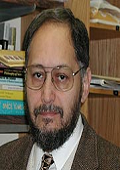
Biography
Biography: Gonzalo Munévar
Abstract
The main value of the exploration of space is that it transforms our views of the Earth and the universe to the significant benefit of our species. As we explore space we challenge our science, and as we challenge our science we change it in ways so profound that we come to face a different panorama of problems and opportunities in our dealings with the world. Indeed, it is as if a new world opens up to us; and when we try to adapt to the new “lay of the land,” ideas and inventions occur to us that would have been unimaginable under the old perspective. It has often been argued that scientific exploration leads to serendipitous discoveries, but such arguments are supported mainly by historical anecdotes. In my view, however, serendipity is a natural, practically inevitable consequence of scientific exploration. My argument thus depends on the very nature of scientific exploration and on the way that nature is illustrated in space science and other aspects of our space missions. For example, our mission to study the chemistry of Venus’ atmosphere led to the discovery of the depletion of the ozone layer on Earth. Space telescope missions led to the discovery of Dark Energy, on the heels of the confirmation of the existence of Dark Matter, and to the realization that the standard model in physics accounts for only a very small percentage of phenomena in the universe. Similar illustrations of serendipity can be found in practically all types of space missions. They are more likely the more our spaceships move into the unknown. And they will help us discover hitherto unsuspected problems and transform science so as to place us in a better position to find solutions.

